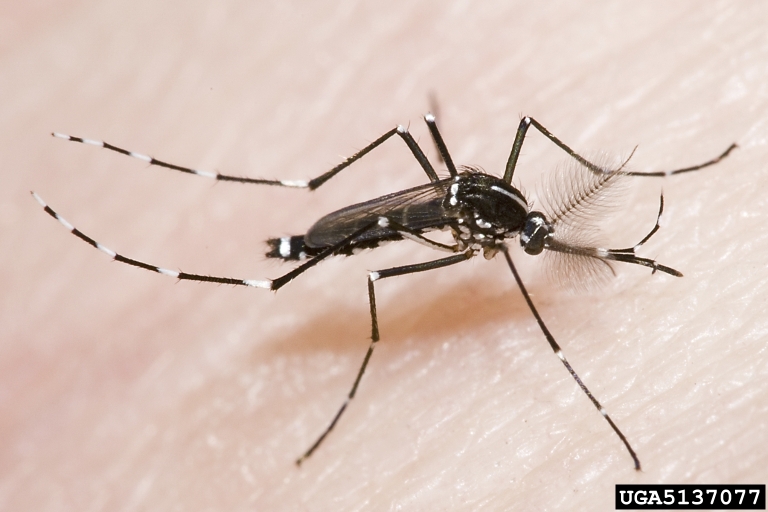
by Mark Tancig | Jul 29, 2021
Now that we’re getting plenty of rain and the temperatures are nice and toasty, our nemesis to enjoying the outdoors is back in full force. Yes, I’m talking mosquitoes, the reason for inventing window screens! If you’re gardening outside these days, you’ve probably been annoyed by one of the many mosquito species that occur in our area. Many of these mosquitoes are native species that play an important role in the food chain, feeding many aquatic and terrestrial wildlife, but some of them, like the daytime biting Asian tiger mosquito, are invasive species that were accidentally introduced. While mosquitoes are an important food source to more charismatic critters, they are annoying and can spread disease, and so we can benefit by reducing their presence.
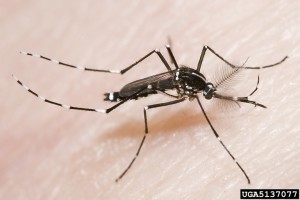
The Asian tiger mosquito, another annoying invasive species. Photo credit: Susan Ellis, Bugwood.org.
In addition to the age-old advice of draining any standing water, there are other control methods that can be very effective at reducing the mosquito population. One of the most effective and least-toxic options is the use of Bti products. These products come in granular or “donut” forms with the smaller granules being best for various uses around the home and the dunks/donuts for larger areas of standing water like ponds. These Bti products are considered a type of biological control since it is a species of bacteria, Bacillus thuringiensis israelensis to be precise, that causes mosquito, blackfly, and fungus gnat larvae to perish as they wiggle around and grow into their pupal stage. Because it only affects a narrow range of species, it is considered a selective pesticide that does not cause harm to non-target species, such as bees, birds, butterflies, frogs, lizards, and other desirable garden visitors. Bti can be sprinkled into rain barrels, bird baths, bromeliads, gutters, and other places where water may stand more than 5-7 days, the amount of time needed for mosquito eggs to develop into adults.
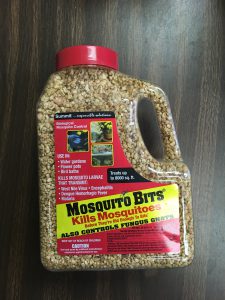
Bti granules prevent mosquito larvae from becoming biting adults. Photo by: Mark Tancig, UF/IFAS.
If considering other methods of mosquito control, such as the use of foggers, keep in mind that many of the pesticides used to control adult mosquitoes are not selective products and can kill the pollinators you may be trying to invite to your garden. Additionally, planting citronella plants, eating copious amounts of garlic, wearing repellent bracelets, or using ultra-sonic devices or cell phone apps has not been shown to repel mosquitoes so stick to what is known to work.
For a more enjoyable mosquito season, keep the window screens tight, wear long pants and sleeves and use appropriate repellents when outdoors, and do your best to minimize standing areas of water. If you have questions about mosquitoes and their control, visit the UF/IFAS Florida Medical Entomology Lab website (https://fmel.ifas.ufl.edu/) and browse the many resources available.
by Mary Salinas | Oct 20, 2018
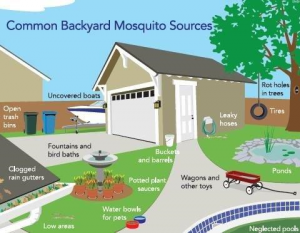
A natural disaster such as Hurricane Michael can cause excess standing water which leads nuisance mosquito populations to greatly increase. Floodwater mosquitoes lay their eggs in the moist soil. Amazingly, the eggs survive even when the soil dries out. When the eggs in soil once again have consistent moisture, they hatch! One female mosquito may lay up to 200 eggs per batch . Standing water should be reduced as mush as possible to prevent mosquitoes from developing.
You should protect yourself by using an insect repellant (following all label instructions) with any of these active ingredients or using one of the other strategies:
- DEET
- Picaridin
- Oil of lemon eucalyptus
- Para-menthane diol
- IR3535
- An alternative is to wear long-sleeved shirts and pants – although that’s tough in our hot weather
- Wear clothing that is pre-treated with permethrin or apply a permethrin product to your clothes, but not your skin!
- Avoid getting bitten while you sleep by choosing a place with air conditioning or screens on windows and doors or sleep under a mosquito bed net.
Now let’s talk about mosquito control in your own landscape.
Let’s first explore what kind of environment in your landscape and around your home is friendly to the proliferation of mosquitoes. Adult mosquitoes lay their eggs on or very near water that is still or stagnant. That is because the larvae live in the water but have to come to the surface regularly to breeze. The small delicate larvae need the water surface to be still in order to surface and breathe. Water that is continually moving or flowing inhibits mosquito populations.
Look around your home and landscape for these possible sites of still water that can be excellent mosquito breeding grounds:
- bird baths
- potted plant saucers
- pet dishes
- old tires
- ponds
- roof gutters
- tarps over boats or recreational vehicles
- rain barrels (screen mesh over the opening will prevent females from laying their eggs)
- bromeliads (they hold water in their central cup or leaf axils)
- any other structure that will hold even a small amount of water (I even had them on a heating mat in a greenhouse that had very shallow puddles of water!)
You may want to rid yourself of some of these sources of standing water or empty them every three to four days. What if you have bromeliads, a pond or some other standing water and you want to keep them and yet control mosquitoes? There is an environmentally responsible solution. Some bacteria, Bacillus thuringiensis ssp. israelensis or Bacillus sphaericus, only infects mosquitoes and other close relatives like gnats and blackflies and is harmless to all other organisms. Look for products on the market that contain this bacteria.
For more information:
Mosquito Repellents
UF/IFAS Mosquito Information Website
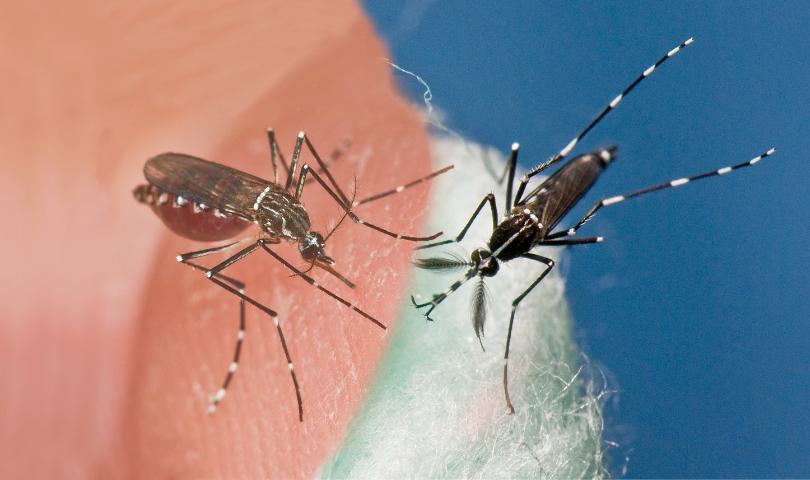
by Mary Salinas | Jul 7, 2016
The Zika virus has made us all more aware of the need to avoid getting bit by mosquitoes when we travel to those destinations that have confirmed reports of Zika infected mosquitoes. The Centers for Disease Control and Prevention lists the countries and territories that have travel notices to consult prior to planning a trip or traveling.
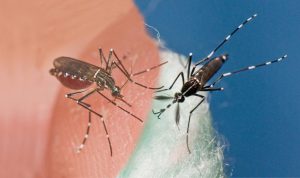
The invasive mosquitoes Aedes aegypti (left) and Aedes albopictus (right) occur in the Americas, including Florida, and have been implicated in the transmission of Zika virus.
Credit: J Newman, UF/IFAS/FMEL
The Florida Department of Health has recommendations for preventative action to take when traveling to any location that has confirmed Zika virus.
- You should use an insect repellant (following all label instructions) with any of these active ingredients:
- DEET
- Picaridin
- Oil of lemon eucalyptus
- Para-menthane diol
- IR3535
- Wear long-sleeved shirts and pants
- Wear clothing that is pre-treated with permethrin or apply a permethrin product to your clothes, but not your skin!
- Avoid getting bitten while you sleep by choosing a place with air conditioning or screens on windows and doors or sleep under a mosquito bed net.
According to the Georgia Department of Public Health you should also protect yourself against mosquito bites for at least a week after you return home from any location that has confirmed Zika. You may have an active infection without symptoms that can be spread to others through mosquito bites.
Now let’s talk about mosquito control in your own landscape.
Even though we don’t have confirmed Zika infection in Florida mosquitoes at this writing, mosquitoes in our state can transmit other diseases such as: eastern equine encephalitis, dengue fever, dog or cat heartworm, chikungunya, malaria, St. Louis encephalitis and west Nile virus.
Let’s first explore what kind of environment in your landscape and around your home is friendly to the proliferation of mosquitoes. Adult mosquitoes lay their eggs on or very near water that is still or stagnant. That is because the larvae live in the water but have to come to the surface regularly to breeze. The small delicate larvae need the water surface to be still in order to surface and breathe. Water that is continually moving or flowing inhibits mosquito populations.
Look around your home and landscape for these possible sites of still water that can be excellent mosquito breeding grounds:
- bird baths
- potted plant saucers
- pet dishes
- old tires
- ponds
- roof gutters
- tarps over boats or recreational vehicles
- rain barrels (screen mesh over the opening will prevent females from laying their eggs)
- bromeliads (they hold water in their central cup or leaf axils)
- any other structure that will hold even a small amount of water (I even had them on a heating mat in a greenhouse that had very shallow puddles of water!)
You may want to rid yourself of some of these sources of standing water or empty them every three to four days. What if you have bromeliads, a pond or some other standing water and you want to keep them and yet control mosquitoes? There is an environmentally responsible solution. Some bacteria, Bacillus thuringiensis ssp. israelensis or Bacillus sphaericus, only infects mosquitoes and other close relatives like gnats and blackflies and is harmless to all other organisms. Look for products on the market that contain this bacteria.
For more information:
Zika, a Mosquito-Transmitted Virus
Mosquito Repellents
UF/IFAS Mosquito Information Website
Florida Container Mosquitoes

by Mary Salinas | Nov 9, 2015
Are you plagued with mosquitoes in your yard? Does it seem like you have a greater infestation than your neighbors? There may be some solutions to solve the problem other than using pesticides that negatively impact beneficial insects in your landscape.

Asian tiger mosquito. Photo credit: Susan Ellis, Bugwood.org.
Mosquitoes are not only annoying, they can transmit serious diseases such as: eastern equine encephalitis, dengue fever, dog or cat heartworm, chikungunya, malaria, St. Louis encephalitis and west Nile virus.
Let’s first explore what kind of environment in your landscape and around your home is friendly to the proliferation of mosquitos. Adult mosquitoes lay their eggs on or very near water that is still or stagnant. That is because the larvae live in the water but have to come to the surface regularly to breeze. The small delicate larvae need the water surface to be still in order to surface and breathe. Water that is continually moving or flowing inhibits mosquito populations.
Look around your home and landscape for these possible sites of still water that can be excellent mosquito breeding grounds:
- bird baths
- potted plant saucers
- pet dishes
- old tires
- ponds
- roof gutters
- tarps over boats or recreational vehicles
- rain barrels (screen mesh over the opening will prevent females from laying their eggs)
- bromeliads (they hold water in their central cup or leaf axils)
- any other structure that will hold even a small amount of water (I even had them on a heating mat in a greenhouse that had very shallow puddles of water!)
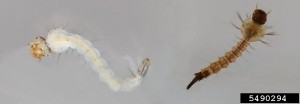
Mosquito larvae. Photo credit: Ari Farajollahi, Bugwood.org.
You may want to rid yourself of some of these sources of standing water or empty them every three to four days. What if you have bromeliads, a pond or some other standing water and you want to keep them and yet control mosquitoes? There is an environmentally responsible solution. Some bacteria, Bacillus thuringiensis ssp. israelensis or Bacillus sphaericus, only infects mosquitoes and other close relatives like gnats and blackflies and is harmless to all other organisms. Look for products on the market that contain this bacteria.
For more information:
UF/IFAS Mosquito Information Website
Biological Control of Mosquitoes







